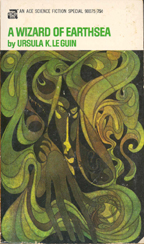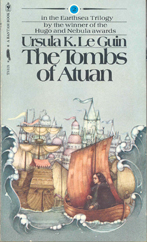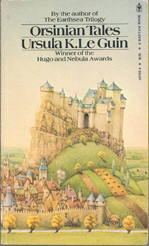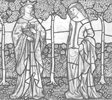Ursula K. Le Guin
Le Guin is unquestionably the most gifted writer ever to tackle high fantasy - her rich, gorgeous language is a bit like Dunsany, but she far exceeds him in her uncanny ability to evoke time, place, sense, and inner state.
She's the literary equivalent of a Vermeer, crafting prose poetry instead of fiction.
I haven't gotten to her Earthsea books yet, but if they're anywhere near as technically impressive as her Orsinian Tales, I'd recommend them over almost anything else discussed on this site. (JA)
|
 A Wizard of Earthsea (1969) A Wizard of Earthsea (1969)
Where I come from, the most enjoyable fantasy results from a writer starting with a supernatural archetype and then treating it naturalistically, so you actually imagine real people in those fanciful situations. For all its erudition, Tolkien's trilogy is mostly about questions like "What do heroes eat while they're on a quest to save the world?" Le Guin sets up a world where magic works (provided you have the gift and you know the True Name of whatever you're trying to work magic on), and answers the question "Where do wizards learn their wizardry?" So young Sparrowhawk goes from the remote island of Gont to the central island of Roke, and enters the School for Wizards, while trying to come to terms with his tremendous talent for magic and the equally tremendous temptation to use it for Not-Good.
Yep, another coming of age story, and more suspenseful than most, because you really don't know how the main character is going to handle the challenges he's created for himself. When I recently re-read the book, I was struck by how many incidents Le Guin crams into a relatively short narrative - one minute Sparrowhawk is tending a sick youth on a humble island, the next he's grappling with a Nameless Power in the frozen north - without ever seeming choppy, which is a testament to her simple, elegant prose style and an unerring sense of pacing.
(DBW)
|

|
|
|
 The Tombs Of Atuan (1970) The Tombs Of Atuan (1970)
This time, Le Guin introduced a couple of radical concepts to fantasy: 1) a woman's life might be as interesting to read about as a man's; and 2) a main character's internal life might be more interesting than their feats of derring do.
The main character doesn't even have any magic powers: Arha is a lonely young woman taken from her parents and trained since early childhood to be a high priestess in service of nameless forces no one quite believes in anymore. When she finds an intruder - a personable young wizard, no less - in the labyrinth beneath her gods' most sacred shrine, resulting events lead her to experience shock, anger, scorn, fear and finally friendship, which puts her in a very touchy spot with her human and supernatural superiors.
Structurally, the book could hardly be more different from Wizard: the plot unfolds slowly, and virtually everything takes place in one location, unlike the whirlwind tour of Earthsea's many islands the first book had taken us on. But it's equally vivid, and for me even more rich and involving;
Le Guin creates a heroine who's mixed-up and uncertain but still unmistakeably heroic, grounded by prose that's clear and concrete but never ordinary.
(DBW)
|

|
|
|
 Orsinian Tales (1976) Orsinian Tales (1976)
This is a collection of otherwise unrelated short stories that all are set in a vaguely located, make-believe Eastern European country (the word "Orsinia" appears nowhere within the book).
Otherwise, they're not fantasy in any sense, and certainly not high fantasy.
Most of them take place in the early or middle 20th century in grim little cities and bucolic countryside dwellings, and here she's masterful at suggesting the oppressive gloominess of poverty and totaliarianism.
There's also a piece that describes a rather gentlemanly 17th century civil war, and a creepy tale of murder from the 12th century.
Mostly, though, her subject matter could hardly be more mundane: what she's really interested in is the slow, stately rhythms of domestic life, with people of all ages, occupations, and temperaments being portrayed.
Often she uses a flawed, frustrated love affair as a plot device, but just as often hardly anything is going on at all.
The book couldn't possibly be farther from swords and sorcery, but if you want to be completely transported into other people's lives, this is a deeply engrossing, if scattershot, diversion. (JA)
|

|
|
|

